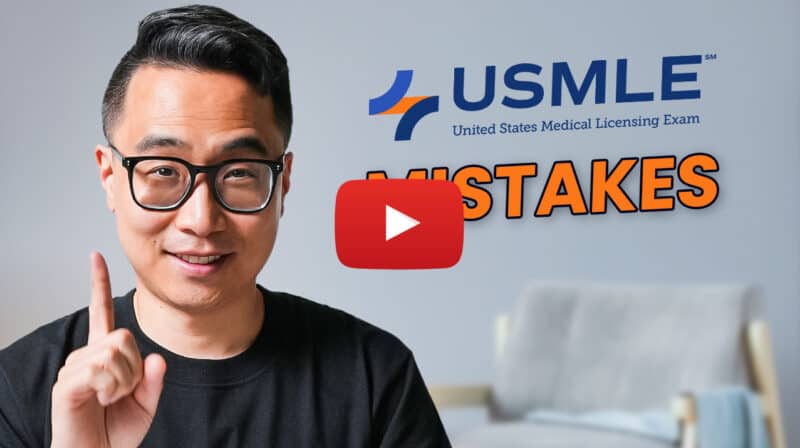
Ever found yourself drowning in USMLE preparation materials, wondering if you’re studying the right way? You’re not alone. Many medical students approach these exams the same way they’ve tackled medical school tests—and that’s where the trouble begins. Here’s something fascinating: while most students focus on what to study, the real secret lies in how you study.
In this article, we will explore the three most critical mistakes the students make during their USMLE preparation and, more importantly, how to transform these challenges into opportunities for success.
Mistake #1: Underestimating the Exam’s Complexity
One of the most significant mistakes students make is underestimating the complexity of the exam. Medical school exams often reward short-term memorization. You might succeed by memorizing lectures slides or cramming facts the night before. But the USMLE demands something entirely different—a comprehensive understanding that connects basic sciences with clinical applications.
This isn’t just about knowing more facts; it’s about understanding how these facts interact in real clinical scenarios. The USMLE tests your ability to apply knowledge across different contexts, much like a physician must do in actual practice.
For example, a medical school exam might ask you to recall the side effects of a medication. The USMLE, however, could require you to identify a diagnosis based on a patient case incorporating those side effects into the clinical context. This shift demands a deeper understanding of concepts and their applications. For a deeper dive into how to tackle this, read more here.
Consequence of Underestimation
This underestimation has become even more significant in the pass/fail transition of Step 1, as it led many students to focus more on their school exams, assuming these will adequately prepare them. Unfortunately, this often creates a false sense of security. In the first year of the pass/fail transition, Step 1 failure rates for U.S. MD students more than doubled from 3% to 9%.
How to Avoid This Mistake?
To prevent this mistake, start by gaining a comprehensive understanding of the USMLE format, particularly the clinical vignette-style questions that prioritize application over memorization. Taking practice tests early on can also be extremely beneficial, as it allows you to pinpoint areas of weakness and build a strong foundation for setting achievable goals. Resources like the NBME Self-Assessments can help simulate the exam experience and provide critical feedback.
Mistake #2 Avoiding Weak Areas
Here’s a psychological insight that might surprise you: we often respond to psychological challenges the same way we respond to physical threats. When you receive a poor score on a practice test, your brain might react as if you’re facing a real danger–triggering avoidance behaviors that feel protective but actually harm your preparation. This leads to common pattern: students avoid their weak areas, skip practice questions, and postpone taking practice tests. It’s like having a painful tooth but avoiding the dentist—the problem only grows worse with time.
The solution? Take your first practice test early. Yes, it might be uncomfortable. Yes, the score might be lower than you’d like. But here’s the magic: that early score becomes your baseline for measuring improvement. For example, if your score increases from 140 to 180 over two months, it indicates that your studying is effective. Similarly, if your score remains at 180 for two months with no improvement, it suggests that your study strategy needs to be adjusted. Check out this guide on how to adjust timelines effectively to stay on track.
Mistake #3 Focusing on Resources Instead of Methods
Have you ever asked a successful USMLE test-taker about their study strategy? They’ll likely list resources: UWorld, First Aid, Amboss, and more. But here’s something you might not know: the top 1% and the bottom 1% of test-takers often use the exact same resources. The real difference? How they use them.
Think of it like cooking. Having high-quality ingredients doesn’t guarantee a great dish; it’s all about the technique. Unfortunately, many students fall into what’s known as the “Frankenstein plan”—picking random strategies from various sources, creating a disjointed approach that’s less effective than any single, focused approach.
The key isn’t about gathering more resources, but about using a select few, high-quality ones well. Focus on resources that align with your learning style and allow for deep understanding. For example, “First Aid” and “UWorld” can be game-changers when used correctly. Avoid common pitfalls with tools like UWorld by following expert tips on how to boost your scores.
Incorporating active learning techniques, like spaced repetition and flashcards, helps solidify your knowledge. These methods encourage active engagement with the material, helping you retain information more effectively than passive reading or last-minute cramming. For more on Anki’s best practices, check this guide.
Conclusion
Understanding these mistakes is just the beginning. The real transformation happens when you shift your approach from passive learning to active understanding. Here’s what that means: Instead of memorizing facts, focus on understanding underlying principles. Rather than avoiding weak areas, confront them head-on with structured principle. And most importantly, choose quality over quantity in your study resources.
Remember, the USMLE isn’t just another test—it’s a stepping stone to becoming a better physician. By avoiding these critical mistakes and embracing a more effectively study approach, you’re most just preparing for an exam—you’re building the foundation for your medical career.
Ready to transform your USMLE preparation? Start by taking an honest look at your current study habits. Are you failing into any of these traps? The good news is: awareness is the first step toward improvement. And now that you know what to look for, you’re already ahead of the game.








